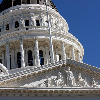New Legislation Places Limits on Termination of Superintendents Without Cause

December 2023
Number 44
On October 13, 2023, Governor Gavin Newsom signed Senate Bill (SB) 494, which limits the circumstances under which a school board can take action to terminate cabinet-level employees. First, SB 494 prohibits the governing board of a school district from taking action to terminate a superintendent or assistant superintendent without cause, at a special or emergency meeting of the board. Second, SB 494 prohibits the governing board from taking action to terminate a superintendent or assistant superintendent within 30 days after the first meeting of the board after an election at which one or more members are elected or recalled.
Background
Sudden changes in school superintendents can have lasting impacts on a school community. SB 494 increases transparency and helps ensure that school board members are given adequate time to become informed and familiar with cabinet-level issues before making significant personnel decisions.
In arguing the need for these legislative changes, the bill’s author cited recent issues faced by the Orange Unified School District after that district called a special meeting of the board during the winter holiday break, providing only 24-hour notice of the meeting. During this meeting, the board terminated the school district superintendent without cause and appointed an interim replacement. Five weeks later, the interim replacement resigned, leaving the school district without a superintendent.
Termination Without Cause v. With Cause
Under the Education Code, grounds for termination with cause can include unsatisfactory performance, immoral or unprofessional conduct, dishonesty, and evidence of unfitness for service. SB 494 only affects termination of a superintendent or assistant superintendent without cause.
Cooling Off Period
This bill prohibits the governing board of a school district from terminating a superintendent or assistant superintendent without cause, within 30 days after the first meeting of the board after a general election at which one or more members are elected or recalled. These 30 days provide a “cooling off period” for existing board members and give new members a chance to familiarize themselves with specific issues facing their district, as well as the fundamentals of board governance, before the board makes a decision to terminate a superintendent or assistant superintendent without cause.
Regular v. Special or Emergency Board Meetings
School district governing boards may convene regular meetings with 72-hour public notice. Special meetings require 24-hour public notice. However, emergency meetings may be convened with less than 24-hour public notice to allow a board to address matters that severely impair public health and/or safety or pose a threat of immediate danger to the public. SB 494 will require 72-hour public notice prior to a decision as to whether a superintendent or assistant superintendent should be terminated without cause. In practical effect, this means that the specific action to terminate a superintendent or assistant superintendent without cause can only be taken at a regular meeting.
Takeaways
Under SB 494, school boards can only take action to terminate superintendents or assistant superintendents without cause at regular board meetings. Additionally, after an election during which one or more board members are elected or recalled, a board must wait 30 days after the first meeting of the new board before taking action to terminate a superintendent or assistant superintendent without cause.
For more information about SB 494, or if you have any other labor and employment questions, please contact the authors of this Client News Brief or an attorney at one of our eight offices located statewide. You can also subscribe to our podcasts, follow us on Facebook, Twitter and LinkedIn or download our mobile app.
Number 44
On October 13, 2023, Governor Gavin Newsom signed Senate Bill (SB) 494, which limits the circumstances under which a school board can take action to terminate cabinet-level employees. First, SB 494 prohibits the governing board of a school district from taking action to terminate a superintendent or assistant superintendent without cause, at a special or emergency meeting of the board. Second, SB 494 prohibits the governing board from taking action to terminate a superintendent or assistant superintendent within 30 days after the first meeting of the board after an election at which one or more members are elected or recalled.
Background
Sudden changes in school superintendents can have lasting impacts on a school community. SB 494 increases transparency and helps ensure that school board members are given adequate time to become informed and familiar with cabinet-level issues before making significant personnel decisions.
In arguing the need for these legislative changes, the bill’s author cited recent issues faced by the Orange Unified School District after that district called a special meeting of the board during the winter holiday break, providing only 24-hour notice of the meeting. During this meeting, the board terminated the school district superintendent without cause and appointed an interim replacement. Five weeks later, the interim replacement resigned, leaving the school district without a superintendent.
Termination Without Cause v. With Cause
Under the Education Code, grounds for termination with cause can include unsatisfactory performance, immoral or unprofessional conduct, dishonesty, and evidence of unfitness for service. SB 494 only affects termination of a superintendent or assistant superintendent without cause.
Cooling Off Period
This bill prohibits the governing board of a school district from terminating a superintendent or assistant superintendent without cause, within 30 days after the first meeting of the board after a general election at which one or more members are elected or recalled. These 30 days provide a “cooling off period” for existing board members and give new members a chance to familiarize themselves with specific issues facing their district, as well as the fundamentals of board governance, before the board makes a decision to terminate a superintendent or assistant superintendent without cause.
Regular v. Special or Emergency Board Meetings
School district governing boards may convene regular meetings with 72-hour public notice. Special meetings require 24-hour public notice. However, emergency meetings may be convened with less than 24-hour public notice to allow a board to address matters that severely impair public health and/or safety or pose a threat of immediate danger to the public. SB 494 will require 72-hour public notice prior to a decision as to whether a superintendent or assistant superintendent should be terminated without cause. In practical effect, this means that the specific action to terminate a superintendent or assistant superintendent without cause can only be taken at a regular meeting.
Takeaways
Under SB 494, school boards can only take action to terminate superintendents or assistant superintendents without cause at regular board meetings. Additionally, after an election during which one or more board members are elected or recalled, a board must wait 30 days after the first meeting of the new board before taking action to terminate a superintendent or assistant superintendent without cause.
For more information about SB 494, or if you have any other labor and employment questions, please contact the authors of this Client News Brief or an attorney at one of our eight offices located statewide. You can also subscribe to our podcasts, follow us on Facebook, Twitter and LinkedIn or download our mobile app.
Disclaimer: As the information contained herein is necessarily general, its application to a particular set of facts and circumstances may vary. For this reason, this News Brief does not constitute legal advice. We recommend that you consult with your counsel prior to acting on the information contained herein.







